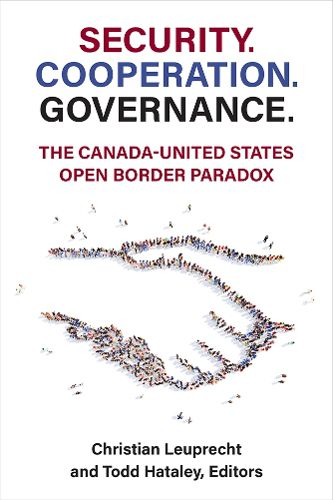Readings Newsletter
Become a Readings Member to make your shopping experience even easier.
Sign in or sign up for free!
You’re not far away from qualifying for FREE standard shipping within Australia
You’ve qualified for FREE standard shipping within Australia
The cart is loading…






Historically, national borders have evolved in ways that serve the interests of central states in security and the regulation of trade. This volume explores Canada-US border and security policies that have evolved from successive trade agreements since the 1950s, punctuated by new and emerging challenges to security in the twenty-first century. The sectoral and geographical diversity of cross-border interdependence of what remains the world's largest bilateral trade relationship makes the Canada-US border a living laboratory for studying the interaction of trade, security, and other border policies that challenge traditional centralized approaches to national security.
The book's findings show that border governance straddles multiple regional, sectoral, and security scales in ways rarely documented in such detail. These developments have precipitated an Open Border Paradox: extensive, regionally varied flows of trade and people have resulted in a series of nested but interdependent security regimes that function on different scales and vary across economic and policy sectors. These realities have given rise to regional and sectoral specialization in related security regimes. For instance, just-in-time automotive production in the Great Lakes region varies considerably from the governance of maritime and intermodal trade (and port systems) on the Atlantic and Pacific coasts, which in turn is quite different from commodity-based systems that manage diverse agricultural and food trade in the Canadian Prairies and US Great Plains.
The paradox of open borders and their legitimacy is a function of robust bilateral and multilevel governance based on effective partnerships with substate governments and the private sector. Effective policy accounts for regional variation in integrated binational security and trade imperatives. At the same time, binational and continental policies are embedded in each country's trade and security relationships beyond North America.
$9.00 standard shipping within Australia
FREE standard shipping within Australia for orders over $100.00
Express & International shipping calculated at checkout
Historically, national borders have evolved in ways that serve the interests of central states in security and the regulation of trade. This volume explores Canada-US border and security policies that have evolved from successive trade agreements since the 1950s, punctuated by new and emerging challenges to security in the twenty-first century. The sectoral and geographical diversity of cross-border interdependence of what remains the world's largest bilateral trade relationship makes the Canada-US border a living laboratory for studying the interaction of trade, security, and other border policies that challenge traditional centralized approaches to national security.
The book's findings show that border governance straddles multiple regional, sectoral, and security scales in ways rarely documented in such detail. These developments have precipitated an Open Border Paradox: extensive, regionally varied flows of trade and people have resulted in a series of nested but interdependent security regimes that function on different scales and vary across economic and policy sectors. These realities have given rise to regional and sectoral specialization in related security regimes. For instance, just-in-time automotive production in the Great Lakes region varies considerably from the governance of maritime and intermodal trade (and port systems) on the Atlantic and Pacific coasts, which in turn is quite different from commodity-based systems that manage diverse agricultural and food trade in the Canadian Prairies and US Great Plains.
The paradox of open borders and their legitimacy is a function of robust bilateral and multilevel governance based on effective partnerships with substate governments and the private sector. Effective policy accounts for regional variation in integrated binational security and trade imperatives. At the same time, binational and continental policies are embedded in each country's trade and security relationships beyond North America.